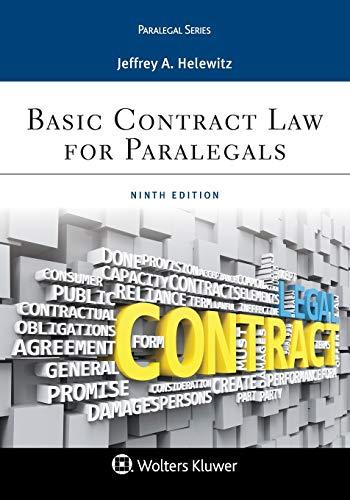The San Francisco Superior Court entered judgment against Brawn of California, Inc. (Brawn), a mail order company,
Question:
The San Francisco Superior Court entered judgment against Brawn of California, Inc. (Brawn), a mail order company, ruling that Brawn had engaged in a deceptive business practice by charging its customers an ‘‘insurance fee’’ of $1.48 with every order placed. The ruling presumed that Brawn, rather than its customers, bears the loss of risk in transit, so that its customers received nothing of value in return for paying the fee. The court also awarded plaintiff litigation expenses in the amount of $24,699.21 and attorney fees in the amount of $422,982.50.
We reverse, concluding that Brawn did not bear the risk of loss of goods in transit under the applicable California Uniform Commercial Code sections discussed, post.
Background Brawn markets clothing through its catalogs and over the Internet. When a customer places an order, Brawn packages it, and holds it at its warehouse, where it is picked up by a common carrier and delivered to the customer, using an address provided by the customer. At all times relevant, the terms of Brawn’s mail order form required the customer to pay the listed price for the goods purchased, plus a delivery fee and a $1.48 ‘‘insurance fee.’’ As to the last, the form recited: ‘‘INSURANCE: Items Lost or Damaged in Transit Replaced Free.’’ Brawn based the insurance fee on the costs to it of replacing any goods lost in transit, and Brawn did indeed replace, without further cost to the customer, any goods that had been lost in transit. Brawn rarely, if ever, sold its goods to a customer unwilling to pay the insurance fee.
On February 5, 2002, and again on February 7, 2002, plaintiff Jacq Wilson (plaintiff) purchased items from Brawn’s catalogue, each time paying the insurance fee. On February 13, 2002, Wilson, acting on behalf of himself and all other similarly situated persons, brought suit against Brawn, contending that in charging the fee, Brawn violated the unfair competition law, Business and Professions Code section 17200 et seq., prohibiting unfair competition, and Business and Professions Code section 17500 et seq., prohibiting false advertising.
Plaintiff’s suit was premised on the theory that by charging customers an insurance fee, Brawn suggested to them that they were paying for and receiving a special benefit—insurance against loss in transit—when in fact, customers did not need insurance against loss in transit because Brawn already was required to pay for that loss as a matter of law. The trial court agreed, finding that irrespective of the insurance fee, Brawn bore the risk of loss of goods in transit, reasoning that the fee was an ‘‘illusory’’ benefit. The court found that Brawn’s customers were likely to be deceived by the insurance fee, and that Brawn therefore had engaged in a deceptive business practice, entitling its customers to restitution.
Standard of Review Our decision is based on our construction and application of statutory law, and not on any disputed issue of fact. Questions of law, such as statutory interpretation or the application of a statutory standard to undisputed facts, are reviewed de novo........
Questions
1. How is the risk of loss apportioned under the California UCC?
2. How does the court justify a sale on approval theory when the item is paid for prior to shipment?
3. Distinguish between a sale on approval and a sale or return.
Step by Step Answer:






